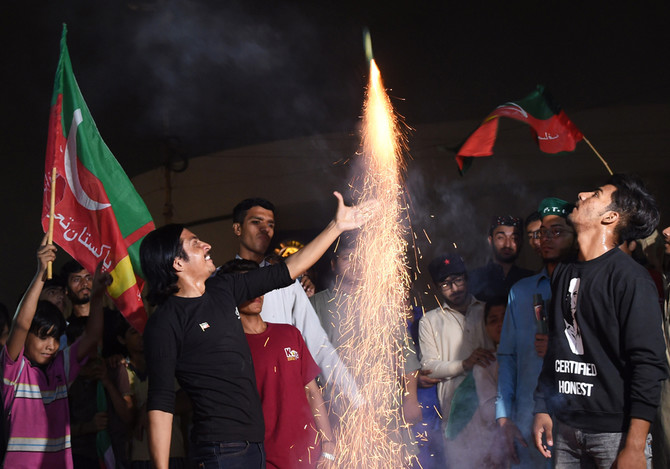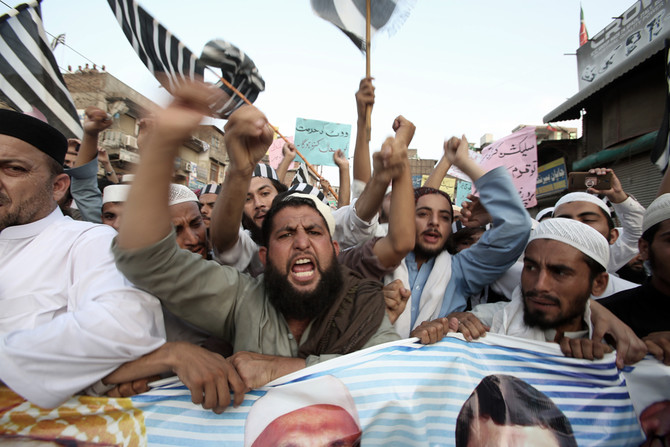ISLAMABAD: The all-rounder cricket legend turned politician, Imran Khan, and his Pakistan Tehreek-e-Insaf (PTI) claimed victory even before the country’s official election results were announced. This claim sent his political rivals into a frenzy as poll figures sealed their defeats. That trend continued to widen during the vote counting process from Election Day to late Thursday evening.
Some of the so-called unassailable contestants were left stunned at the preliminary results and cried foul. Rigging accusations spiked. The Election Commission of Pakistan (ECP), however, rejected all such assertions.
The self-proclaimed people’s political champions could not fathom their losses in constituencies that had been theirs for decades while Khan emerged victor in all five constituencies he stood in.
PTI officially leads with 115 seats in the National Assembly according to the latest ECP statistics – a monumental leap forward from its 28 seats in previous general elections. So what changed?
“Better sense among the public prevailed. General awareness by the media and PTI’s anti-corruption campaign exposed the ruling party and the political elite on opposition benches changed the public perception. Days of fiery and venomous speeches to tilt voters in their favor are over. People want actions, not empty promises,” said political analyst Asad Mehmood to Arab News.
“In a few constituencies, veteran political notables have maintained their positions where the public mindset is under their spell; however, the big names have been largely rejected by the masses.”
Successful businessman and die-hard loyalist of the outgoing ruling party, Pakistan Muslim League-Nawaz (PML-N), and former Prime Minister Shahid Khaqan Abbasi who assumed power after Nawaz Sharif’s judicial ouster in 2017, lost both seats in the National Assembly (NA). One of the constituencies has been his family’s native stronghold since the 1980s and yet he suffered defeat.
Imprisoned ex-premier Sharif’s younger brother and former Chief Minister of Punjab, Shahbaz Sharif, lost two NA seats to PTI in the southern commercial city of Karachi and in Swat, Pakistan’s equivalent of Switzerland, but retained the Sharifs’ center of gravity in Lahore city.
PTI came close to delivering a blow in Faisalabad, a city sworn to PML-N. Former law minister of Punjab, Rana Sanaullah, won but with a small margin with the party’s Abid Sher Ali losing and declaring the result “a complete fraud”. The PTI winning streak knocked out PML-N’s Khawaja Saad Rafique at the hands of voters who chose Khan.
Former Interior Minister of State and Sharif loyalist, Talal Chaudhry, also lost an NA seat. Former Foreign Minister Khawaja Asif also lost his NA seat to the PTI candidate in Sialkot.
Aftab Ahmed Khan Sherpao, chief of Qaumi Watan, was completely eliminated in the election race. Since 1977, he has been politically undefeated.
In the northwest, PTI’s candidate crushed Awami National Party’s (ANP) President Asfandyar Wali Khan in his home constituency. ANP’s Ghulam Ahmed Bilour, uncle of the deceased politician Haroon Bilour, killed recently in a terror attack, went down defeated by PTI in Peshawar.
Sirajul Haq, leader of Pakistan’s largest religious party Jamat-e-Islami (JI) which was contesting elections under a five-party alliance of Muttahida Majlis-e-Amal (MMA), failed to win anything in the 2018 general election.
Chief of MMA, Maulana Fazlur Rehman, suffered a similar fate losing in constituencies to PTI featherweights.
Assassinated ex-premier Benazir Bhutto’s son, Bilawal Bhutto Zardari, who was launched into politics by his father, former President Asif Ali Zardari, won in his native constituency, Larkana, in the interior of Sindh but lost an NA seat in Malakand of Khyber Pakhtunkhwa.
Individual candidate ex-Interior Minister Chaudhry Nisar Ali Khan who left PML-N after a disagreement with Nawaz Sharif lost both national and provincial seats. He has maintained his vote bank in Rawalpindi since 1985 but lost his position to PTI.
Mustafa Kamal of Pak Sarzameen Party, the man credited for the fall of Altaf Hussain and fracturing his Muttahida Qaumi Movement (MQM), lost both his NA seats.
Political expert Zafar Jaspal explained, “The reason behind PTI’s victory is that PML-N was in power in the last election — same is the case with MQM and it has not served the people and so lost its strength — whereas Imran Khan’s party, with its agenda of change and a focus on uprooting corruption captured public attention and won hearts and minds.”
Jaspal told Arab News, “They are new-comers and seek accountability. We have witnessed what transpired and led to Sharif’s ouster and sentencing along with his daughter and son-in-law. That is why the general public realized they need to give PTI a chance and voted on the basis of the party’s agenda, its demand for accountability, and promises of better governance.”















